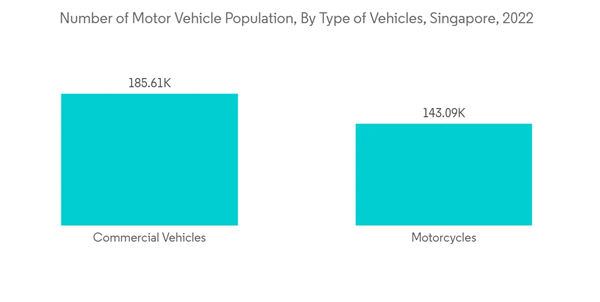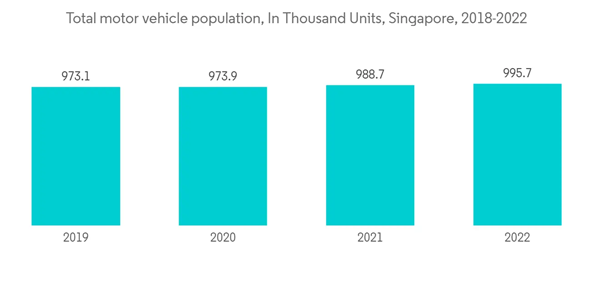The COVID-19 outbreak in 2020 and the first half of 2021 significantly affected the industrial and automotive sectors, caused major production disruptions, and negatively affected customers' purchasing power in Singapore, limiting the Singapore lubricants market growth. However, the industry recovered well in 2022, as the situation became normal. The number of motor vehicles on the road in the country was 988,755 units by the end of 2022.
Key Highlights
- Over the medium term, one of the major factors driving the market studied is the growing demand for new automotive vehicles.
- On the flip side, the growing adoption of electric vehicles will likely hinder the market's growth.
- Furthermore, the increasing adoption of bio-based lubricants is likely an opportunity.
- The automotive and other transportation industries dominated the market, expected to grow during the forecast period.
Singapore Lubricants Market Trends
Increasing Demand for Automotive Sector
- The automotive sector is the largest consumer of lubricants in Singapore. Lubricants are used in automobiles in engine oil, coolants, brake oil, and other transmission oils.
- Singapore is one of the Asia-Pacific region's most promising and fastest-growing vehicle markets. Several factors, including labor availability, R&D activities, location advantage, and government backing, support the automotive sector in Singapore.
- The Government of Singapore issues the Certificate of Entitlement (COE) to its citizens to state the right to vehicle ownership. In recent years, the government gave many COEs to the citizens, leading to higher vehicle sales.
- Furthermore, according to LTA (Land Transport Authority), as of the end of 2022, there was a total of approximately 995 thousand motor vehicles in Singapore. Passenger vehicles (PV) accounted for the largest share of 67% of the total number of on-road vehicles in 2022, followed by commercial cars (CVs) and motorcycles (MCs), with a share of 19% and 14%, respectively.
- Additionally, Singapore is considered the gateway for trade in the Asia-Pacific region, owing to the infrastructure and the logistic facilities available.
- Thus, the factors above are expected to impact the automotive industry, which, in turn, may affect the growth of the lubricant demand in the country.
Engine Oil to Dominate the Market
- Engine oils form the leading product type due to their high volume requirements and short drain intervals, as they are used in high-temperature and high-pressure applications. It is often known as motor oil and is made to lubricate internal combustion engine parts, as well as to shield them from corrosion and keep them cool while operating.
- Engine oil is composed of two major components: base stock and additives. Typically, 95% of the solution comprises base stock derived from petroleum, synthetic chemicals, or a combination of the two. The base stock is in charge of dissipating accumulated heat and lubricating the moving elements of an engine.
- The additives, on the other hand, make up around 5% of the oil, and it is these compounds in charge of precisely regulating the oil's lubricity and viscosity and shielding engine parts from wear. For instance, Zinc dialkyl dithiophosphate (ZDDP) is a commonly used additive for preventing wear, while magnesium sulphonates aid in the breakdown of pollutants and engine sludge.
- Engine oils find applications in various end-user industries, including automotive, power generation, heavy-duty equipment, and other industries. There are typically three types of engine oil such as mineral oil, semi-synthetic oil, and full synthetic oil.
- Engine oil consumption increases gradually as the population of motor vehicles increases in the country. For instance, according to the LTA, the number of motor vehicles in Singapore increased from 988,755 in 2021 to around 995,746 in 2022.
- With the increasing demand from various sectors in the country, engine oil consumption is expected to boost during the forecast period.
Singapore Lubricants Market Competitor Analysis
The Singapore lubricants market is fragmented in nature. Some of the major players in the market include (not in a particular manner) BP PLC (Castrol), Exxon Mobil Corporation, Shell plc, Chevron Corporation, and TotalEnergies SE.Additional benefits of purchasing the report:
- The market estimate (ME) sheet in Excel format
- 3 months of analyst support
This product will be delivered within 2 business days.
Table of Contents
1 INTRODUCTION1.1 Study Assumptions
1.2 Scope of the Study
2 RESEARCH METHODOLOGY
3 EXECUTIVE SUMMARY
4 MARKET DYNAMICS
4.1 Drivers
4.1.1 Increasing Demand for New Automotive Vehicles
4.1.2 Active Ship Building and Repair Industry
4.2 Restraints
4.2.1 Growing Adoption of Electric Vehicles
4.2.2 Other Restraints
4.3 Value Chain / Supply Chain Analysis
4.4 Porter's Five Forces Analysis
4.4.1 Bargaining Power of Suppliers
4.4.2 Bargaining Power of Buyers/Consumers
4.4.3 Threat of New Entrants
4.4.4 Threat of Substitute Products
4.4.5 Intensity of Competitive Rivalry
5 MARKET SEGMENTATION (Market Size in Volume)
5.1 Product Type
5.1.1 Engine Oil
5.1.2 Transmission & Gear Oil
5.1.3 Metalworking Fluid
5.1.4 Hydraulic Fluid
5.1.5 Grease
5.1.6 Other Product Types
5.2 End-user Industry
5.2.1 Power Generation
5.2.2 Automotive
5.2.3 Heavy Equipment
5.2.4 Metallurgy and Metalworking
5.2.5 Other End-user Industries
6 COMPETITIVE LANDSCAPE
6.1 Mergers and Acquisitions, Joint Ventures, Collaborations, and Agreements
6.2 Market Share(%)**/Ranking Analysis
6.3 Strategies Adopted by Leading Players
6.4 Company Profiles
6.4.1 AP Oil
6.4.2 BP PLC (Castrol)
6.4.3 Chevron Corporation
6.4.4 Exxon Mobil Corporation
6.4.5 Fuchs
6.4.6 Idemitsu Kosan Co. Ltd
6.4.7 Motul
6.4.8 Shell plc
6.4.9 TotalEnergies SE
6.4.10 United Oil Company Pte Ltd
7 MARKET OPPORTUNITIES AND FUTURE TRENDS
7.1 Increasing Adoption of Bio-based Lubricants
Companies Mentioned (Partial List)
A selection of companies mentioned in this report includes, but is not limited to:
- AP Oil
- BP PLC (Castrol)
- Chevron Corporation
- Exxon Mobil Corporation
- Fuchs
- Idemitsu Kosan Co. Ltd
- Motul
- Shell plc
- TotalEnergies SE
- United Oil Company Pte Ltd










